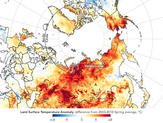
Back التغير المناخي في القطب الشمالي Arabic Změna klimatu v Arktidě Czech Folgen der globalen Erwärmung in der Arktis German Deshielo ártico Spanish Klima aldaketa Artikoan Basque تغییرات اقلیمی در قطب شمال Persian Arktisen alueen kutistuminen Finnish Changement climatique dans l'Arctique French Կլիմայական փոփոխությունները Արկտիկայում Armenian Perubahan iklim di Arktik ID
Due to climate change in the Arctic, this polar region is expected to become "profoundly different" by 2050.[1]: 2321 The speed of change is "among the highest in the world",[1]: 2321 with the rate of warming being 3-4 times faster than the global average.[2][3][4][5] This warming has already resulted in the profound Arctic sea ice decline, the accelerating melting of the Greenland ice sheet and the thawing of the permafrost landscape.[1]: 2321 [6] These ongoing transformations are expected to be irreversible for centuries or even millennia.[1]: 2321
Natural life in the Arctic is affected greatly. As the tundra warms, its soil becomes more hospitable to earthworms and larger plants,[7] and the boreal forests spread to the north - yet this also makes the landscape more prone to wildfires, which take longer to recover from than in the other regions. Beavers also take advantage of this warming to colonize the Arctic rivers, and their dams contributing to methane emissions due to the increase in stagnant waters. The Arctic Ocean has experienced a large increase in the marine primary production as warmer waters and less shade from sea ice benefit phytoplankton.[8] At the same time, it is already less alkaline than the rest of the global ocean, so ocean acidification caused by the increasing CO2 concentrations is more severe, threatening some forms of zooplankton such as pteropods.[1]: 2328
The Arctic Ocean is expected to see its first ice-free events in the near future - most likely before 2050, and potentially in the late 2020s or early 2030s.[9] This would have no precedent in the last 700,000 years.[10][11] Some sea ice regrows every Arctic winter, but such events are expected to occur more and more frequently as the warming increases. This has great implications for the fauna species which are dependent on sea ice, such as polar bears. For humans, trade routes across the ocean will become more convenient. Yet, multiple countries have infrastructure in the Arctic which is worth billions of dollars, and it is threatened with collapse as the underlying permafrost thaws. The Arctic's indigenous people have a long relationship with its icy conditions, and face the loss of their cultural heritage.
Further, there are numerous implications which go beyond the Arctic region. Sea ice loss not only enhances warming in the Arctic but also adds to global temperature increase through the ice-albedo feedback. Permafrost thaw results in emissions of CO2 and methane that are comparable to those of major countries. Greenland melting is a significant contributor to global sea level rise. If the warming exceeds - or thereabouts, there is a significant risk of the entire ice sheet being lost over an estimated 10,000 years, adding up to to global sea levels. Warming in the Arctic may affect the stability of the jet stream, and thus the extreme weather events in midlatitude regions, but there is only "low confidence" in that hypothesis.
- ^ a b c d e Constable, A.J.; Harper, S.; Dawson, J.; Holsman, K.; Mustonen, T.; Piepenburg, D.; Rost, B. (2022). "Cross-Chapter Paper 6: Polar Regions". Climate Change 2022: Impacts, Adaptation and Vulnerability. 2021: 2319–2367. Bibcode:2021AGUFM.U13B..05K. doi:10.1017/9781009325844.023.
- ^ "Arctic warming three times faster than the planet, report warns". Phys.org. 20 May 2021. Retrieved 6 October 2022.
- ^ "The Arctic is warming four times faster than the rest of the world". 14 December 2021. Retrieved 6 October 2022.
- ^ Rantanen, Mika; Karpechko, Alexey Yu; Lipponen, Antti; Nordling, Kalle; Hyvärinen, Otto; Ruosteenoja, Kimmo; Vihma, Timo; Laaksonen, Ari (11 August 2022). "The Arctic has warmed nearly four times faster than the globe since 1979". Communications Earth & Environment. 3 (1): 1–10. doi:10.1038/s43247-022-00498-3. hdl:11250/3115996. ISSN 2662-4435. S2CID 251498876.
- ^ Chylek, Petr; Folland, Chris; Klett, James D.; Wang, Muyin; Hengartner, Nick; Lesins, Glen; Dubey, Manvendra K. (25 June 2022). "Annual Mean Arctic Amplification 1970–2020: Observed and Simulated by CMIP6 Climate Models". Geophysical Research Letters. 49 (13). doi:10.1029/2022GL099371. S2CID 250097858.
- ^ Shepherd, Andrew; Ivins, Erik; Rignot, Eric; Smith, Ben; van den Broeke, Michiel; Velicogna, Isabella; Whitehouse, Pippa; Briggs, Kate; Joughin, Ian; Krinner, Gerhard; Nowicki, Sophie (12 March 2020). "Mass balance of the Greenland Ice Sheet from 1992 to 2018". Nature. 579 (7798): 233–239. doi:10.1038/s41586-019-1855-2. hdl:2268/242139. ISSN 1476-4687. PMID 31822019. S2CID 219146922. Archived from the original on 23 October 2022. Retrieved 23 October 2022.
- ^ Lindsey, Rebecca (18 January 2012). "Shrub Takeover One Sign of Arctic Change". ClimateWatch Magazine. NOAA. Retrieved 19 January 2012.
- ^ Kennedy, Caitlyn (1 December 2011). "Sea Ice Declines Boost Arctic Phytoplankton Productivity". ClimateWatch Magazine. NOAA. Retrieved 20 January 2012.
- ^ Jahn, Alexandra; Holland, Marika M.; Kay, Jennifer E. (5 March 2024). "Projections of an ice-free Arctic Ocean". Nature Reviews Earth & Environment. 5 (3): 164–176. doi:10.1038/s43017-023-00515-9.
- ^ Overpeck, Jonathan T.; Sturm, Matthew; Francis, Jennifer A.; et al. (23 August 2005). "Arctic System on Trajectory to New, Seasonally Ice-Free State". Eos, Transactions, American Geophysical Union. 86 (34): 309–316. Bibcode:2005EOSTr..86..309O. doi:10.1029/2005EO340001.
- ^ Butt, F. A.; H. Drange; A. Elverhoi; O. H. Ottera; A. Solheim (2002). "The Sensitivity of the North Atlantic Arctic Climate System to Isostatic Elevation Changes, Freshwater and Solar Forcings" (PDF). Quaternary Science Reviews. 21 (14–15): 1643–1660. doi:10.1016/S0277-3791(02)00018-5. OCLC 108566094. Archived from the original (PDF) on 10 September 2008.
© MMXXIII Rich X Search. We shall prevail. All rights reserved. Rich X Search



